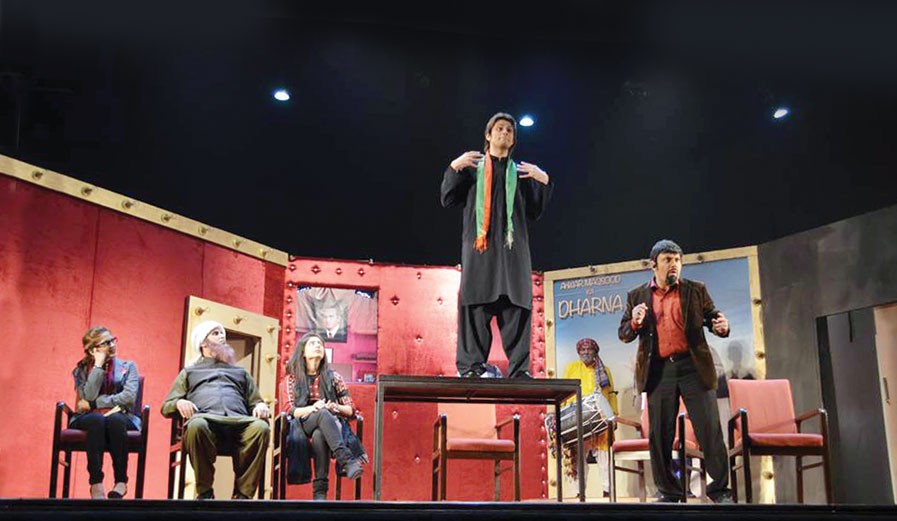
KopyKats’ latest theatrical production is an interesting example of how the dharnas have become a bane for some and a boon for others

The buzzword in Pakistan for the latter half of 2014 has undoubtedly been ‘dharna’. The prolonged sit-ins staged by the Pakistan Tehrik-e-Insaaf (PTI) and Pakistan Awami Tehreek (PAT) have, for better or worse, become a part of the country’s political history. More than the dharnas themselves, it is their ripple effect that has brought about a change in the Pakistani mindset.
Producer-director Dawar Mehmood’s astute observation about the news-worthiness of the dharna ‘phenomenon’ led to the latest KopyKats production currently entertaining the audiences in Lahore.
Catchily titled Anwar Maqsood Ka Dharna, the hour and a half long play is a collaboration between the KopyKats team and Pakistan’s master satirist Anwar Maqsood.
Having worked together on the acclaimed Pawney 14 August, its sequel Sawa 14 August, Aangan Terah and Half Plate, their latest production differs in its content and style from the earlier, thought-provoking plays. According to Mehmood, the intent was to provide some comic relief to a public getting disillusioned with the political impasse. Going by the laughing crowds at Ali Auditorium, the team has definitely achieved its objective.
The play was first staged in Islamabad, from where it travelled to Lahore. The success of the production can be assessed by the fact that the play’s 10-day run has been extended in the city.
Anwar Maqsood Ka Dharna captures the action on a talk-show set in Pakistan during these times of political uncertainty. The play opens with a bumbling, and woefully uninformed, talk show host being instructed by his producer on how to notch up the show’s ratings.
Enter the representatives of each major political party in Pakistan. There is the arrogant minister representing the powers-that-be; the Maulana from JUI; the young and non-serious female representative of PPP; the requisite foreign-educated ‘neutral’ analyst; and the man of the moment, Imran Khan.
Bilawal Bhutto-Zardari and a spokesperson from the MQM are given brief cameos on the ‘screens’ in the television show. The self-exiled leader of the MQM is granted due importance through his ‘telephonic’ participation. The interactions between the politicians while being egged on by the show host form the basic story line.
Much like the dharnas that provided the inspiration for the production, the play has received a mixed response. The theatre-going crowds have loved the light-hearted take on the political instability in the country. Critics, on the other hand, have found much to complain about. For them, there is no sting in the script penned by the mighty Maqsood.
The play has been criticised for lacking in depth as the characters are reduced to mere stereotypes. However, those stereotypes hit the nail on the head by highlighting the aspect of political and social stereotyping set off by the Islamabad dharnas.
The acting of the young cast was accordingly representative of each politician’s type. Among those who stood out were Dawar Mehmood’s self-important Imran Khan and the Ishtiaq Rasul’s bravado affecting PML-N representative.
Another criticism has been about the sense of directionlessness that defines the action on the pseudo-stage. Interestingly, that is professed to have been the intent all along. According to the director and the scriptwriter, the play is a portrayal of the inanity that has become the hallmark of political talk shows in Pakistan. The unconstructive debate that millions of Pakistanis are treated to every day is reflected in the personal barbs the pretentious politicians launch at each other. Serious political discourse is rarely found on television now and what better way to highlight the media’s irresponsible attitude than by mirroring such shows.
Deconstructing an ongoing process is always a tough job and Maqsood acknowledges that it was not simple to encapsulate the complexity of Pakistani politics in a stage play.
Having said that, the success of the play can be attributed to the deliberate inclusion of references to moments that have defined each political player during the course of the past few months.
The production’s tongue-in-cheek attitude towards a matter of grave national importance was apparently frowned upon by the reigning authorities at the Alhamra Arts Council in Lahore and PMC in Islamabad and the KopyKats team was advised to look for alternative venues.
An outstanding feature of the production was the work of senior makeup artist Kamaluddin who boasts 45 years of experience on PTV. He totally transformed the features of each actor. His expert workmanship could be part of the reason why the crowd screamed and clapped every time, for instance, ‘Imran Khan’ came on stage. The voiceover of Altaf Hussain, done by Mehmood himself, was also spot-on.
Despite being rather generic, Anwar Maqsood Ka Dharna managed to capture the essence of the current political discourse in the country. The host’s ‘point’ and neck-turning as opposing politicians argued succinctly, expressed the paparazzi-ish role our electronic media has played in this political drama.
Played at the very end, the audio clip by Anwar Maqsood about the Peshawar tragedy poignantly portrayed the importance of setting aside differences to build a stronger and safer Pakistan.